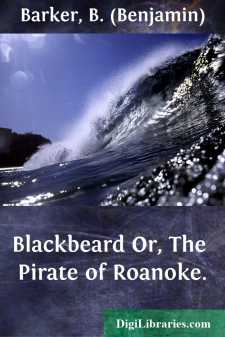Categories
- Antiques & Collectibles 13
- Architecture 36
- Art 48
- Bibles 22
- Biography & Autobiography 813
- Body, Mind & Spirit 142
- Business & Economics 28
- Children's Books 14
- Children's Fiction 11
- Computers 4
- Cooking 94
- Crafts & Hobbies 4
- Drama 346
- Education 46
- Family & Relationships 57
- Fiction 11829
- Games 19
- Gardening 17
- Health & Fitness 34
- History 1377
- House & Home 1
- Humor 147
- Juvenile Fiction 1873
- Juvenile Nonfiction 202
- Language Arts & Disciplines 88
- Law 16
- Literary Collections 686
- Literary Criticism 179
- Mathematics 13
- Medical 41
- Music 40
- Nature 179
- Non-Classifiable 1768
- Performing Arts 7
- Periodicals 1453
- Philosophy 64
- Photography 2
- Poetry 896
- Political Science 203
- Psychology 42
- Reference 154
- Religion 513
- Science 126
- Self-Help 84
- Social Science 81
- Sports & Recreation 34
- Study Aids 3
- Technology & Engineering 59
- Transportation 23
- Travel 463
- True Crime 29
Blackbeard Or, The Pirate of Roanoke.
Categories:
Description:
Excerpt
CHAPTER I.
The Island of Trinidad. Landing of the Earl of Derwentwater and his party upon the Isle—Its Enchanted Scenery. Unnatural Sounds. Sudden appearance of the Notorious Pirate Blackbeard.
Situated upon the broad bosom of the vast Atlantic Ocean, about two hundred leagues from the coast of Brazil, is a small but fertile island, which has retained from the period of its first discovery, the familiar name of Trinidad. This beautiful island, although a lovely and sequestered spot, has been for various general reasons, but rarely visited by the hardy mariners of the deep, and never permanently settled or inhabited by man. Its surface is agreeably diversified with high hills and low beautiful valleys, whilst its circumference is almost wholly surrounded by a chain of dark, rocky cliffs, which gives to this remote island a somewhat fantastic appearance to the eye of the beholder, as he approaches it from the sea. On this circumscribed but favored spot of earth, nature seems to have reveled in almost boundless profusion, scattering here and there throughout its valleys her choicest favors, in the shape of delicious tropical fruits, and ever green luxuriant herbage, whose fragrance as it mingled with the pure fresh breeze of the ocean, has proved to be a sweet balsam of health to many a sick and weary mariner as he sailed within reach of its invigorating influence. Although this fair island possessed no convenient harbor for its vessels of any class, still there was upon its southern side, a small piece of white sandy beach, upon which a single boat might easily land, and here upon this same spot, a boat did land about an hour after sunrise, on the thirty-first day of October, 1717.
The boat in question, was occupied by six persons, who, as soon as its keel grazed upon the clear white sand, immediately disembarked and dispersed themselves singly and by twos, in different directions for the purpose of enjoying a short ramble amongst the shady trees and fragrant foliage of the island.
The party to which we have alluded, consisted of the Earl of Derwentwater, a noble looking gentleman, who, apparently had but just spent the prime of life,—his fair niece, Mary Hamilton, a stately and beautiful girl, about twenty-three years of age,—Arthur Huntington and his twin brother, Henry—a huge red headed but fat and good natured son of the 'Emerald Isle,' who acted in the capacity of servant to the earl, and last, though by no means least, a beautiful golden haired, cherry cheerful nymph of fourteen, whom for the sake of a name we shall call Ellen Armstrong.
After having rambled about for a short space of time, the earl and his fair niece suddenly encountered each other on the brow of a rising eminence, when the latter then accosted her companion:
'Dear uncle, this lovely island seems to me, like a miniature paradise, wherein I could always wish to live as long as the precious boon of life should be granted unto me.'
'I declare, Mary,' replied the earl, as a slight smile passed over his noble countenance, 'you appear to be an enthusiast in every thing....


